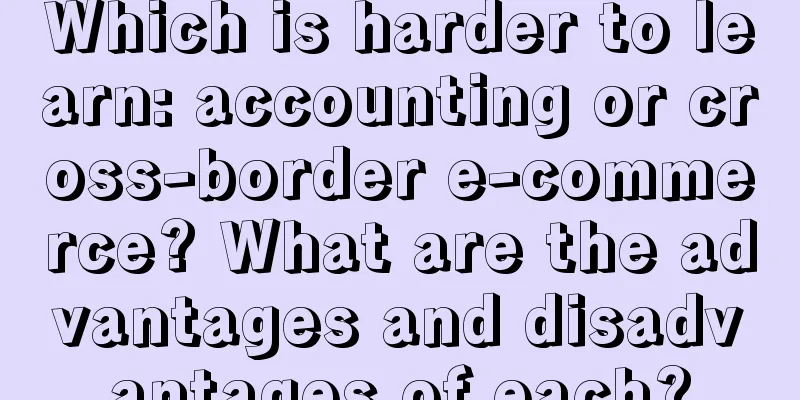Which is harder to learn: accounting or cross-border e-commerce? What are the advantages and disadvantages of each?

|
In today's digital age, accounting and cross-border e-commerce have become popular industries that attract much attention. However, many people are confused about which field to choose for study and development. Is accounting more difficult to learn, or is cross-border e-commerce more challenging? This article will analyze these two fields from different perspectives and explore their respective advantages and disadvantages. 1. Which is harder to learn: accounting or cross-border e-commerce? Accounting is an economic management activity that uses currency as the main unit of measurement, vouchers as the basis, and special methods to conduct comprehensive, integrated, continuous, and systematic accounting and supervision of the economic activities of enterprises, institutions, or other economic organizations, provide economic information, and participate in forecasting and decision-making. Accounting requires learning knowledge in basic accounting, financial accounting, cost accounting, management accounting, financial management, and auditing. Cross-border e-commerce refers to an international business activity in which trading entities in different customs territories reach transactions, make payment settlements through e-commerce platforms, and deliver goods and complete transactions through cross-border logistics. The content that needs to be learned in cross-border e-commerce includes basic knowledge of e-commerce, international trade theory and policy, cross-border e-commerce logistics, cross-border payment, cross-border e-commerce platform operation and other aspects. 2. What are the advantages and disadvantages of each? Advantages of accounting: As a traditional subject, accounting has existed for hundreds of years. Studying accounting can provide individuals with a solid financial foundation, enabling them to understand and apply financial information and make reasonable decisions. In addition, accounting is widely used in various industries, so there are relatively more job opportunities. However, accounting also has some difficulties. First of all, accounting requires rigorous logical thinking and a high degree of precision, and requires a high sensitivity to details. In addition, the frequent changes in accounting regulations and standards are also a challenge, requiring continuous learning and keeping up to date. Advantages of cross-border e-commerce: Cross-border e-commerce is a rapidly developing industry in recent years with huge market potential. Learning cross-border e-commerce can help individuals understand the international market and overseas consumer needs, and help them develop global business. In addition, compared with traditional physical stores, cross-border e-commerce has lower operating costs and higher flexibility. However, cross-border e-commerce also has some challenges. First, as the complexity of international trade increases, the regulations, taxes, and monetary policies involved are becoming more and more complicated. Therefore, it is very important to understand and deal with the laws and regulations of different countries. Secondly, cross-border e-commerce needs to face fierce competition and a high degree of market saturation, which requires innovation and market insight. The combination of accounting and cross-border e-commerce: Although accounting and cross-border e-commerce are two different fields, they are not completely isolated. In fact, accounting plays an important role in cross-border e-commerce. Understanding accounting principles and financial statement analysis is essential for the management and decision-making of cross-border e-commerce companies. At the same time, cross-border e-commerce also provides accountants with broader employment and development opportunities. In summary, accounting and cross-border e-commerce both have their own advantages and disadvantages. Choosing which field to study and develop depends on personal interests, abilities and future plans. No matter which field you choose, continuous learning and updating of knowledge are necessary. At the same time, the combination of accounting and cross-border e-commerce is also a direction worth considering, which can bring more opportunities and development space for individuals. Recommended reading: How to ship goods through cross-border e-commerce? What are the methods? Is Shopee, a cross-border e-commerce platform in Southeast Asia, reliable? What are its advantages? What attributes should be considered when selecting products for cross-border e-commerce? What are the tips for selecting products? |
Recommend
Pinduoduo plans to launch cross-border e-commerce platform Temu in September
Recently, Pinduoduo's upcoming cross-border e-...
How to open a store on Amazon? What are the fees for opening a store on Amazon?
Amazon is a popular cross-border e-commerce platfo...
The vegetable market is the real traffic code
Zibo barbecue is popular again, but is the vegetab...
Does Shopee’s top promotion cost money? How does Shopee operate?
There are still many merchants on Shopee who use p...
What is the registration process for Amazon Middle East Station? How to operate?
There are many merchants opening stores on Amazon&...
Which is the exchange rate for RMB settlement? Will the exchange rate change?
As the global economy becomes increasingly interco...
How long does it take for an Amazon store to be notified if it is linked? How to avoid it?
In Amazon, most people choose to open a store. Som...
How to advertise on Lazada? How does Lazada operate?
Lazada is also a cross-border e-commerce platform....
How to operate Amazon's no-source model? Operation tutorial introduction
Many merchants on Amazon started with the distribu...
In the era of social media, is it still necessary to run a good official website?
In the era of mobile Internet, everyone is moving ...
Can I return items purchased from eBay without any conditions?
eBay online shopping inevitably involves the issue...
The universal formula for operations. Once you learn it, you can handle any performance target, no matter how big it is!
Performance goals can be achieved by improving the...
The live broadcast sold 25 million in one day. How long can he continue to rely on the traffic of "Searching for Relatives"?
Can amateur internet celebrities find a balance be...
What are the advantages of Amazon FBA? How to ship?
Since everyone has chosen the Amazon platform to c...
With over 300 million yuan bet on the European Cup, can Chinese brands rest easy?
Why did the European Cup attract so many Chinese b...









